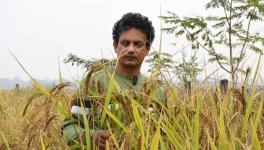Bengal: Unviable Market Conditions, CBM Extraction Add to Woes of Landless Asansol Farmers
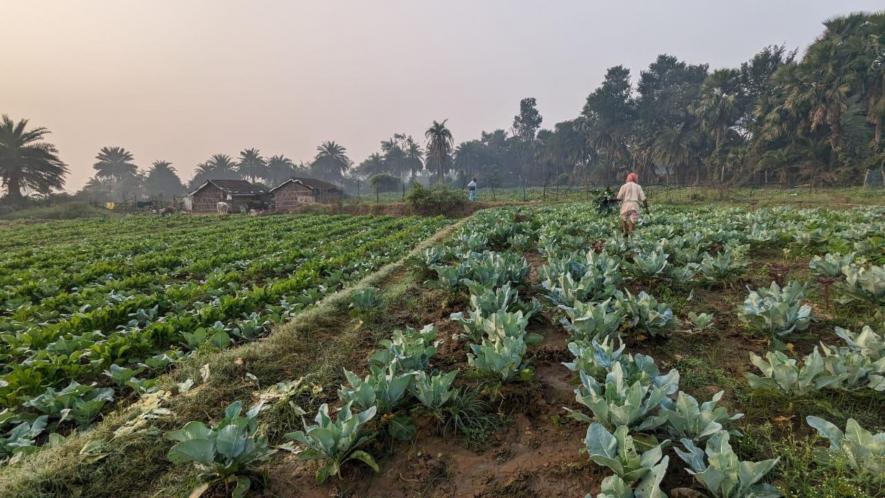
Ram Brij harvesting cauliflowers for the market at sunrise.
Talkuria, a small village in Asansol situated near the banks of the Damodar River, has faced issues around farming and agriculture in the past few years. At first sight, the village appears to be endowed with ponds, date palm trees, lush green fields of paddy, and colourful vegetable gardens.
However, interviews with farmers revealed that about 90% of those in the area are small landless farmers from Bihar who settled in this village 20-30 years ago. The land is owned by landlords who are daily wage labourers themselves, and have given their land to these farmers on a monthly rent of Rs 1,500-2,000 per bigha. In recent years, farming has become increasingly unviable, as the income from agriculture cannot meet farmers' daily needs.
Ram Brij, a farmer from Samastipur (Bihar), told this writer that market conditions had deteriorated, and imagining a livelihood just based on farming seemed unimaginable. The state of agriculture in the region seems to be in complete decline. “We landless farmers can’t even have expectations from the government for support. We do not own the land; we can't ensure cultivation or seek help from the government when needed.” He also mentioned that if the land belonged to the farmers, then they could have utilised government programmes and policies for procuring necessary pieces of equipment, water pipes, fertiliser, and insurance.
Ram Brij has been working on a piece of land for the past 12 years and pays Rs 1,500 per bigha for four bighas of land. Most farmers in the area have taken land on unofficial lease/rent from local landlords, and no help is provided from the landlords regarding agriculture.
Agriculture today in Talkuria is an uncertain practice. There is no knowing if there is going to be a profit or not. Any money left after the sale of their produce is funnelled back into the fields. It is important to note that agriculture as an activity is not purely commercial for all farmers; it is also based on principles of subsistence farming, and the excess produce is sold.
Access to water is scarce and difficult to procure, and given the erratic rainfall and climate variability, the loss of crops is at an all-time high. Any crop that becomes unfit for the market is consumed at home.
Ram Brij mentioned that only 25% of his cauliflower crops was fit to be sold at a decent price in the market. He had planted 2,000 seedlings, out of which only 500 were of the required shape, size, and quality; the rest had to be either sold at a discounted price or used as fodder.
The local inhabitants of the village were farmers until 25-30 years ago, after which the change in climate, rainfall and poor market conditions made them sell their lands to residential contractors or give it on rent/ lease to migrant farmers from Bihar on a fixed rate. Meanwhile, the landowners themselves work as daily wage labourers in other sectors like construction sand, run small shops, or rent farming equipment like tractors. A large number of plots have been cut all around the village.
Barun Mondal, a resident of the village who runs a tea shop, said people had sold off their land or leased them out to migrant farmers. “There are no jobs in the area; people work as daily wagers,” he said. Pointing to a man drinking tea at his shop, he said this person was a farmer, and now works as a daily wager in his own village. Farming has become very difficult; hence, it is easy to lease out one’s own land for a monthly fixed income while working as a daily wage labourer elsewhere.
Earlier, the entire village was filled with paddy fields, but after water sources depleted and rains became erratic, the locals moved away from paddy cultivation. The migrant farmers from Bihar do not plant paddy for the market. They grow vegetables, as the lack of water makes paddy cultivation impossible.
Chinmay Mondal, another resident at the tea shop, said one of the largest difficulties of farming in the village was created by the Great Eastern Energy Corporation Limited (GEECL) gas plants. Dewatering the coal seam significantly reduces the groundwater reserves and, clubbed with a massive decline in rainfall, has made agriculture unviable.
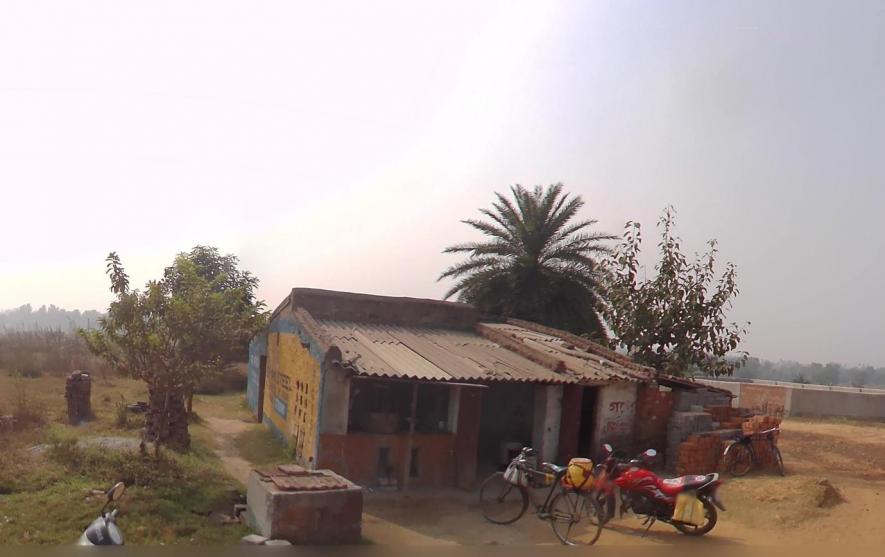
Bauran’s tea shop right opposite a GEECL Gas Plant Unit
Multiple units of gas companies are present in the village for the exploration, production, and development of onshore Coal Bed Methane(CBM). In 2006, Delhi-based GEECL got environmental clearance for the Exploration and Production of CMB gas in Raniganj (South) CBM Block, West Bengal, which included Talkuria.
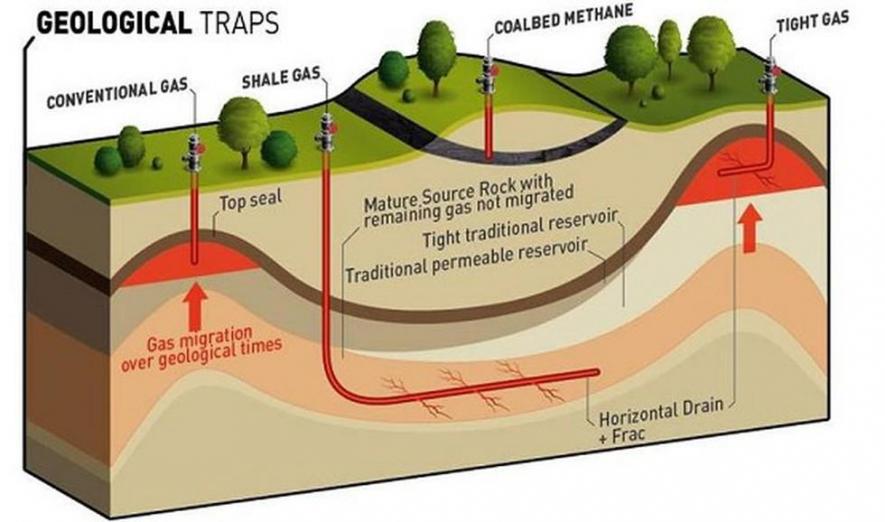
Image Courtesy: Vajiram & Ravi
Research in the Powder River Basin in the US showed that CBM-produced waters increased soil salt levels and altered vegetation composition and density by elevating sodium levels in the soils. Literature from the study indicated that CBM extraction has a huge impact on the groundwater table, for instance, in the Powder River, the water level near coal bed methane development has dropped, as water has been removed during the extraction.
As per an EIA (environment impact assessment) analysis of coal bed methane exploration projects in Chhattisgarh, India, the main issue with water quality was the amount of Total Dissolved Solids (TDS) and the presence of high sodium levels in CBM discharged water, which makes it unsuitable for irrigation. Increased sodium bicarbonate levels in water are lethal ffor fish and all aquatic and riparian vegetation.
Ram Brij also mentioned that the gas plants cause massive long-term damage to the environment and farming. He stated that indigenous trees of date palm, Tal palm (which produces ice apple and is used to make toddy) and papaya don’t grow long enough, and farming has taken a huge hit because of this. The gas plants suck out all the water to access CBM and, in turn, dry out underground water reserves. Farmers cannot use the water from the gas plants as it is unfit for agriculture.
He mentioned that once the water was irrigated, it took seven years for huge amounts of natural fertiliser and phosphate for the soil to reach its optimum level. Water tankers can be seen moving around the village to drain the water from the gas plants. He said, “These tankers release the water anywhere in the village, and wherever the water is released, the soil gets unfit for farming. This is also one of the biggest reasons why there is no paddy cultivation in the area anymore.”
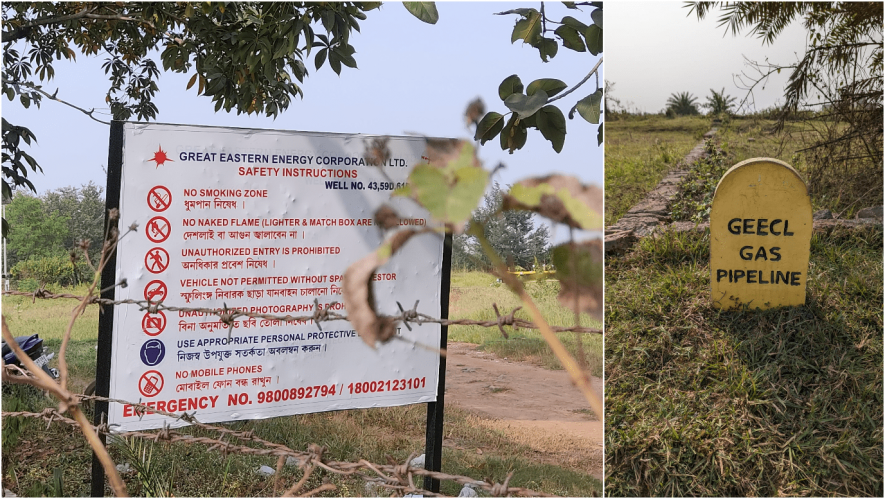
The GEECL gas plant and its pipeline.
Ram Brij said earlier villages in Bihar had no facilities, roads, or transport infrastructure; hence, selling the produce was a difficult task, so he and others from his district moved to other places 30 years ago to look for better livelihoods. He still has farming lands in his hometown in Bihar, where his father and brother practice agriculture.
The owner of his land is a daily wager in the village. On asking about other job opportunities in the village, he said, “Ab mazdoori hi naukri hai, aur bhagwan se uncha naukri hai” (Only labour work is the job now). He also mentioned that large landowners in the village had sold off their land, which have now become residential plots.
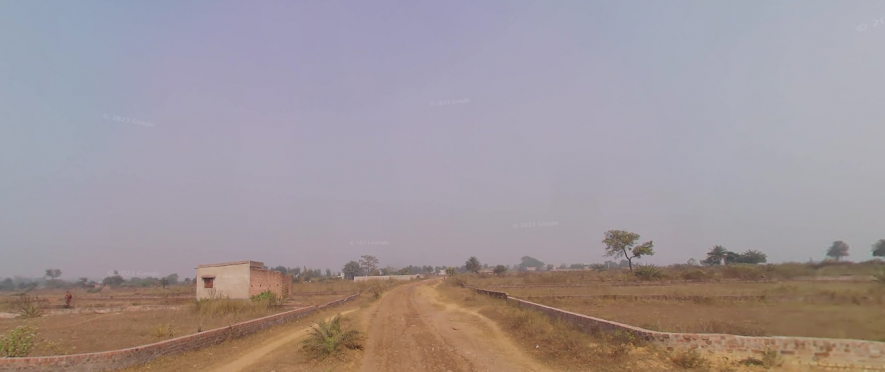
Land cut out as plots right outside Ram Brij’s farm. Image courtesy: Google Street View
Sanjula Devi, from Begusarai, Bihar, uses water from a natural flood drain, which is a little far from her home, using a water pipe. Her husband fell off a tree and lost his life, after which she had to handle all farm work alone with two small children. She says that there is no estimate of profit or loss and that she can't stop doing agriculture, as it feeds her family and requires all her time. On the question of government help, she stated that she used to receive seeds for paddy cultivation from the Department of Agriculture, which were always provided after the cropping season, but” I haven't received anything since the past three years or heard from the department.” The department shifted its offices, after which there has been no contact. The rice she grows is used at home, and the excess is sold in the market.
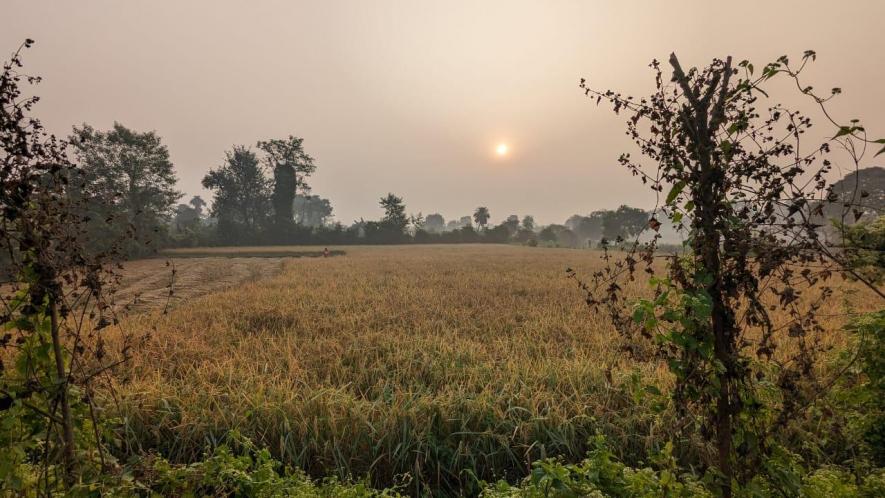
Sanjula’s 11-year-old harvesting paddy with a sickle in the distance
Basudev and his wife, from Samastipur, had planted brinjals and cauliflower on their field a week ago and watered the crop. In a week's time, their crop completely dried out, and they had to incur heavy losses. The biggest issue with water is bringing it from one point in the village to another for farming. This is done using thick water pipes made of rubber or plastic. These pipes last for only two years and cost an average of Rs 2,000 for 250 ft. They also mentioned that all farmers in the area are landless; some might have bought land for making houses or small plots for homestead gardens, but all forms of agriculture for livelihood are being done by landless farmers. They pay Rs 1,800- Rs 2,000 per bigha for their seven bighas as rent to the landlord and have been working on this piece of land for 25-30 years.
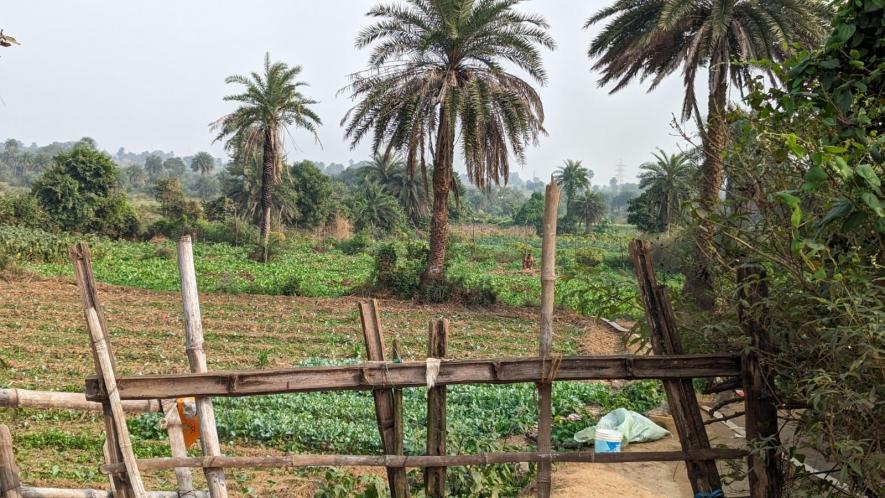
A glance over the fence of Mr. Basudev shows the water pipe.
Basudev also mentioned that a few years ago, he used to receive maize seeds from the Department of Agriculture, but the department would provide seeds after the cropping season, and the seeds provided were of such poor quality that the plants would not fruit.
Now, they have to buy their quota of required seeds from private retail shops as using government-provided seeds was making things more difficult as it doubled their efforts and led to wastage of scarce resources. They said that the government should dig canals near farms to reduce the burden on farming communities. This season, they had planted around 5,000 cauliflower seedlings, out of which only 3,000 were fit for the market.
Basudev stated that a tubewell was being dug nearby to access water, but the drill hit a deposit of methane in the coal bed below, and icaught fire.
The writer is an independent journalist. The vews are personal.
Get the latest reports & analysis with people's perspective on Protests, movements & deep analytical videos, discussions of the current affairs in your Telegram app. Subscribe to NewsClick's Telegram channel & get Real-Time updates on stories, as they get published on our website.














